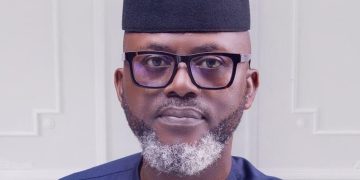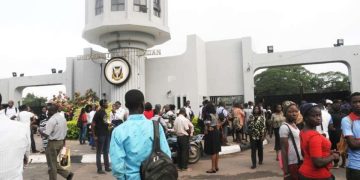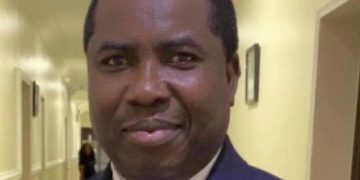BEING A PAPER PRESENTED BY AMBASSADOR (DR.) GODKNOWS BOLADEI IGALI, OON, CO-CHAIRMAN, COMMITTEE OF
PRO-CHANCELLORS OF NIGERIAN UNIVERSITIES AT NUJ/NATIONAL STAR NEWSPAPER NATIONAL SECURITY CONFERENCE NAF CONFERENCE CENTRE, ABUJA, THURSDAY, 22ND FEBRUARY, 2024
Protocol
INTRODUCTION
Let me express deep appreciation to the board and management of National Star Newspaper, especially the Managing Director/Editor-in-Chief, Obinna F. Nwachukwu, PhD and the Chief Chris Isiguzo led National Exco of the Nigerian Union of Journalists (NUJ) for affording us this opportunity to come together to share thoughts at this National Security Conference which has taken on the theme of looking at the linkage between national security and development. By this, you are looking at two critical issues, that is the imperative of peace and security and relatedly, the overriding demand for sustainable economic and social development. These are critical ingredients which we need both for the internal wellbeing of our people and indispensable in properly positioning ourselves for global competitiveness and respect. This conference could therefore not come at a better time.
I also particularly want to appreciate the fact that you have put together an array of the best professionals on this theme including the Chairman of the Police Service Commission, Dr. Solomon Arase, who in heydays of national service was a ‘super cop’ and rose to head the Nigeria Police Force. Not the least are other major speakers including my friend and brother, Sir Chikwendu Udensi whose daytime job and for many years, is focused on security in our country and on the global scene. Even more profound is the fact that our boss, the Secretary to the Government of the Federation (SGF), Sen. George Akume, whose towering record of national service precedes his reputation is here in person, alongside several other top government officials.
It is therefore apt that we examine the critical role which various actors who have overriding control and influence over people in engendering security and safety and by so doing, creating the right enabling environment for development of various forms to take place. As we know, in a country such as Nigeria, religious leaders are custodians of our cultures and traditions and even our political leaders have a great role to play which we shall try to examine in this conversation. Rather than give a lecture, my approach is to raise critical issues for collective examination by all.
The Development and Security Nexus
I think this conference is well timed and becomes quite auspicious when the imperative of ensuring that Nigeria as a country sleeps with its two eyes closed is today considered by our fellow citizens as the number one challenge in view of the situation which we face. Even historically, as a matter of fact, all political philosophers posit that the main purpose why human society exists is to ensure that members of a given community are free from what English philosopher, Thomas Hobbes calls the “state of nature” which is often in his words “governed by lawlessness and chaos.” Hobbes’ liberal theory therefore suggest ‘the only way to escape a state of nature is to create a social contract by coming together in peace and putting in place the framework for mutual existence.’ This position has not been derogated by other philosophers after him such as French thinker, Jean Jacques Rousseau, or John Locke, and even much later Karl Marx.
On the other hand, the whole idea of development encompasses how human communities grow and advance from one level to another and sustain social and economic progress. In recent times, such other indexes as technological, environmental, and even what is regarded as soft infrastructure – education, women advancement, literacy rate, health care and standard of living have come into the mix. Development in general is therefore about making life better for man in the society he has created for himself. As you will agree, this is a legitimate aspiration. I am therefore inclined to reason that economic and social development and security are like conjoined twins which inevitably have to operate in close synergy. They reinforce each other.
BACKGROUND ON THE SPECTRE OF INSECURITY
In recent years, Nigeria has faced various security challenges including insurgency, banditry, kidnapping, communal clashes, and ethno-religious conflicts. Some of the main patterns include:
◆ Boko Haram Insurgency: Boko Haram, an Islamist extremist group, has been responsible for numerous attacks primarily in the northeastern part of Nigeria. Estimates have it that at least 50,000 people have been killed, and 2.5 million displaced as a result of their nefarious activities.
◆ Fulani Herdsmen Conflict: Conflict between farmers and Fulani herdsmen, often fuelled by competition over land and resources, has led to significant violence and loss of lives, particularly in central Nigeria as well as parts of North-West.
◆ Kidnapping: Kidnapping for ransom has become prevalent across Nigeria, with both ordinary citizens and high-profile individuals becoming targets. One study estimates that between July 2022 to July 2023, at least 3,359 people were so kidnapped. Criminal gangs often perpetrate these acts for financial gain.
◆ Banditry: Banditry, particularly in the northwest and central regions, has escalated, with criminals targeting villages, travellers, and even schools for abduction and extortion.
◆ Ethno-religious Conflicts: Nigeria has experienced periodic outbreaks of violence between different ethnic and religious groups, leading to loss of lives and destruction of property.
◆ Armed Robbery: Incidents of armed robbery occur frequently in urban areas, posing a threat to both residents and visitors.
WHAT POLITICAL LEADERS CAN DO
Political leaders and community leaders are in many parts of the country, already playing crucial roles in curbing insecurity in Nigeria. Some of the specific areas include:
Provision of Leadership: Political leaders should focus on formulating and implementing policies aimed at addressing the root causes of insecurity, such as poverty, unemployment, and marginalisation. They need to ensure effective governance, rule of law, and accountability to maintain stability.
Need to provide the Security Infrastructure: Political leaders are responsible for investing in security infrastructure, including law enforcement agencies, intelligence services, and judiciary systems, to combat crime and violence effectively. For example, the estimated number of about 371,800 members of the Police Force or 230,000 active personnel in Nigeria Armed Forces is grossly inadequate.
Resource Allocation: Political leaders allocate resources to support security initiatives, such as training and equipping security forces, implementing community policing programs, and enhancing border security to prevent illicit activities.
Conflict Resolution: Political leaders engage in dialogue and negotiations to resolve conflicts and grievances among different ethnic, religious, and social groups, fostering peace and harmony within communities. Groups such as Afenifere, Middle Belt Forum, Arewa Consultative Forum, Northern Elders Forum, Pan Niger Delta Forum have great work to do.
Community Engagement: Community leaders could and should play a vital role in fostering trust, cooperation, and communication between communities and security agencies. Especially, they should be able to mobilise community members to participate in crime prevention efforts, share information, and collaborate with law enforcement to identify and address security threats.
Promoting Social Cohesion: Both political and community leaders should promote social cohesion by fostering inclusivity, tolerance, and respect for diversity. They work to bridge divides and promote understanding among various groups to prevent the spread of extremism and radicalisation. Leaders of main political parties such as APC, PDP, Labour Party, etc, should transcend petty bickering to thinking of Pan-Nigerian modes. This is same for leaders of cultural and inter-ethnic groups.
Empowering Youth: Leaders should create opportunities for youth empowerment, education, and employment to prevent them from being susceptible to recruitment by criminal or extremist groups. Investing in youth development programs can help steer young people away from violence and crime. It is estimated that 70% of Nigeria’s 217 million population or 151 million are youths. This compels the need to keep them properly engaged for productive ends.
Advocacy and Awareness: It is important that leaders embark on policies and programmes that address the underlying socio-economic factors contributing to insecurity. There is also an urgent demand to raise awareness about the importance of peace, security, and collective responsibility in building a safer and more prosperous society.
Do Traditional Rulers and Religious Leaders have a role to curb insecurity in Nigeria?
Traditional rulers and religious leaders can potentially play a significant role in curbing insecurity in Nigeria. Historically, traditional rulers and leaders of various faiths have held considerable influence and authority within their communities. They often have deep-rooted connections with the local population and possess knowledge of community dynamics, which can be invaluable in addressing security challenges.
Specifically, these roles could include:
• Conflict Resolution: They can mediate conflicts within their communities and foster dialogue among various groups to prevent violence and promote peaceful coexistence.
• Intelligence Gathering: Due to their close ties with the community, traditional rulers in particular and to a lesser extent, religious leaders can gather valuable intelligence on potential security threats and suspicious activities, which can be shared with relevant security agencies for action.
• Community Based Security: Traditional rulers can collaborate with local law enforcement agencies to establish community policing initiatives, where members of the community are actively involved in monitoring and reporting security concerns.
• Return to Promoting Values and Ethics: Pastors, Imams and our Kings serve as custodians of our religious, cultural values and ethics. By promoting positive values and discouraging criminal behaviour, they can contribute to fostering a culture of lawfulness within their communities.
However, for traditional rulers to effectively contribute to curbing insecurity, there needs to be a supportive legal framework, including some form of constitutional provision, adequate financial and material resources, and cooperation with government security agencies.
CONCLUSION: THE IMPERATIVE OF ELITE CONSENSUS.
The various groups, that is Political leaders, Leaders of thought, Community leaders, traditional rulers and religious class, all collectively are known as dominant elite. In a plural society such as ours, their interests may be desparate and sometimes at cross purposes. However what has determined progress on all human societies is the ability of such elite to coalesce their individual and groups interests into a common goal, objective and direction. That is what we refer to as Elite Consensus.
Elite consensus refers to a broad agreement or shared understanding among a select group of influential individuals or institutions within a society. These individuals or institutions often hold significant power, authority, or expertise in various domains such as politics, economics, academia, or culture. Elite consensus can shape policies, decisions, and societal norms, reflecting the dominant perspectives and interests of the elite group. It can influence the direction of public discourse, governance, and the distribution of resources within a society.
On the threshold of Nigeria’s independence nationalist struggle, in the aftermath of the civil war and our Political journey into nationhood, it is Elite consensus that has kept us together and fledgling.
Elite consensus can potentially promote peace and security in society under certain conditions. So when dominant elites from diverse sectors agree on key issues related to peace, security, and stability, they can collaborate to implement effective policies, foster cooperation among different groups, and address underlying causes of conflict.
However, the effectiveness of elite consensus in promoting peace and security depends on several factors:
Inclusivity: The consensus should include diverse perspectives and stakeholders, representing various segments of society. Inclusive consensus-building ensures that the interests and concerns of different groups are considered, increasing the legitimacy and sustainability of peace efforts.
Genuine commitment to Common Goals: Elites must demonstrate a genuine commitment to common goals related to peacebuilding, conflict resolution, and security. This requires prioritizing the collective good over narrow self-interests and political agendas. This came to the fore during the Niger Delta crisis especially between 2000 to 2009. It was the agreement of the elite to collectively work towards the return of peace that finally brought peace to the area and cessation of activities by MEND and in 2016, Niger Delta Avengers
Transparency and Accountability: The process of elite consensus-building should be transparent, with clear mechanisms for accountability. Transparency helps build trust among stakeholders and prevents the manipulation of agreements for personal or group gains.
Long-Term Engagement: Sustainable peace and security require long-term engagement and investment. Elite consensus-building should not be limited to short-term agreements but should involve continuous dialogue, cooperation, and efforts to address underlying grievances and structural inequalities.
Institutional Support: Effective peacebuilding and security initiatives often require the support of robust institutional frameworks, including legal mechanisms, conflict resolution mechanisms, and mechanisms for dispute resolution. In other words, we can have a National Council for Peace and Harmony, drawing memberships from all these groups and classes to promote on continously basis peace, mutual coexistence confidence and harmony. This is without bias to say the National Assembly whose duty is to make laws. We saw this work well during the 2014 National Conference.
So our national elite must rise up and collectively work towards bringing peace, mutual trust, security and harmony back to our country and our communities.
Thank you very much.
























